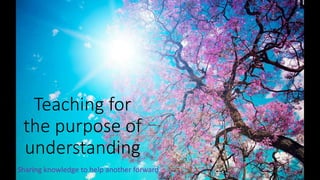I Believe in teaching for understanding
- 1. Teaching for the purpose of understanding Sharing knowledge to help another forward
- 2. Knowledge is familiarity, awareness, or understanding gained through experience or study. Teaching is to help to learn; tell or show (how) We can help each other move forward by imparting necessary information that we all need to succeed.
- 3. Teaching for Understanding: Assisting another in reaching the next level in their learning process. Being willing to continue connecting with students until they do understand. Break down the information to where anyone can grasp the most complex ideas. “Any subject can be taught effectively in some intellectually honest form to any child at any stage of development” (On the Wings of Metaphor, p. 174 Bruner) “Knowing how something is put together… permits you to go beyond it” (On the Wings of Metaphor, p. 175 Bruner)
- 4. Scaffolding: Providing academic or psychosocial support for student learning. A scaffold is a structure to help Raise the student’s participation. “Vygotsky defines the “zone of proximal development” as the “difference between the child’s actual level of development and the level of performance that he achieves in collaboration with the adult.” Children, when they are given the assistance of an adult (mediator), are able to perform more complex Tasks that when they are left to cope on their own.
- 5. Can Vygotsky’s “Zone of Proximal Development” be applied to adults? Some many adults believe that it is “too late” for them, or that they have missed their shot at getting a proper education. To teach is to impart knowledge. We can impart knowledge to children, adults, the elderly; anyone willing to learn. We can help each other reach our full potential.






